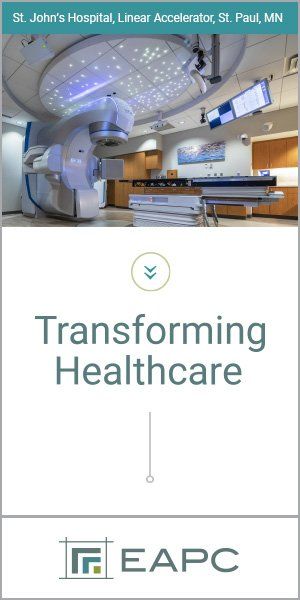Capsules
U of M Announces Plans for New Hospital
The University of Minnesota recently announced the “MPact Health Care Innovation” proposal, which includes plans for a new hospital on the east bank of the Twin Cities campus. It entails buying back its health care facilities from Fairview Health Services, which announced plans to merge with Sanford Health this year. The University says the new hospital would be part of a future medical center that encompasses several blocks. U of M President Joan Gabel says it’s necessary, calling the school’s other hospitals “old”. A newly designed state-of-the-art hospital complex would move clinical and academic medicine forward for the next 50 to 100 years “ It advances care, wellness and health in ways that only a hospital associated with a leading research university can provide,” said President Gabel. The proposed Fairview/Sanford Health merger is drawing increasing criticism. Leaders from those health systems recently attended a community meeting hosted by the Minnesota Attorney General’s Office. Nurses, union leaders and lawmakers expressed their concerns for several reasons. There was similar backlash when the two proposed to merge in 2013. Even the University has questions as it is moving ahead with the MPact Health Care Innovation proposal. “We have no control over that, we’re moving forward with our vision, yes,” said Senior Vice President for Finance and Operations Myron Frans. Planning and construction will take five years, or more, so it is important to begin now to secure the necessary public funding and to plan facilities that will support the top-ranked Medical School and the people of Minnesota. The University will need public support to buy back those buildings, as well as construct the new hospital, which will cost at least a billion dollars. Since the proposed Sanford merger, Fairview states it has engaged in good faith with the University of Minnesota and brought forward many options for how they could fit into the new partnership. Despite repeated requests, they claim to have had no opportunity to meet with university leadership. They further state they look forward to working together with the University to better understand the details of the MPact Health Care vision and determine fair market value for the assets it may require.
SPH Study Cites Increase in Ransomware Attacks on Health Care
The annual number of ransomware attacks on health care provider organizations more than doubled from 2016 to 2021, exposing the personal health information of nearly 42 million individuals. A new report from the University of Minnesota School of Public Health (SPH), published in the Journal of the American Medical Association (JAMA) Health Forum, shows that ransomware attacks on healthcare providers are not just increasing in frequency, they are also becoming more severe — exposing larger quantities of personal health information and affecting large organizations with multiple health care facilities. To conduct the study, researchers created a database called the Tracking Healthcare Ransomware Events and Traits (THREAT), a unique tool that for the first time allows researchers to track the occurrence of ransomware attacks on health care provider organizations. In the first-ever comprehensive analysis of ransomware attacks on U.S. health care providers, researchers documented that between 2016 and 2021:
- 374 instances of ransomware attacks on health care delivery organizations exposed the personal health information of nearly 42 million individuals.
- Ransomware attacks more than doubled on an annual basis, from 43 to 91 per year.
- The number of individuals whose personal health information was exposed increased from approximately 1.3 million in 2016 to more than 16.5 million in 2021.
- Disruptions in care for patients as a result of ransomware incidents occurred in 166 — or 44% — of attacks.
- Among health care delivery facilities, clinics were the most frequent targets of ransomware attacks, followed by hospitals, ambulatory surgical centers, mental/behavioral health facilities, dental practices and post-acute care organizations.
“As health care delivery organizations have increased their reliance on information technology to serve their patients, they have unfortunately also increased their potential exposure to cybersecurity risks, such as ransomware attacks,” said Hannah Neprash, lead author and an assistant professor at SPH. “Despite this increased risk, information about the frequency and scope of these attacks is limited to anecdotal news coverage. This study and the development of the THREAT database addresses this gap, providing the first peer-reviewed analysis of the threat that ransomware poses to health care providers and the millions of patients they serve.” Further research is needed to more precisely understand the operational and clinical care consequences of ransomware attacks on health care providers.
TCO Opens New Bioengineering Lab
The Twin Cities Orthopedics Bioengineering Lab (TCO Bio Lab) opened recently in Eagan on the Viking Lakes campus. It’s the first independent facility of its kind in Minnesota. Dedicated to achieving world-class outcomes, the lab features state-of-the-art technology and resources. Physicians and researchers will be able to conduct industry-leading research studies and training. “The TCO Bio Lab will be one of the top facilities in North America,” said TCO’s Dr. Robert LaPrade. “In addition to being able to provide bench-to-bedside answers for treating complex sports medicine pathologies in the research portion of the lab, it will also allow surgeons to hone their skills and develop improved surgical procedures in the Bioskills Lab. This lab will also provide one of the top opportunities for resident and fellow education in the country.” Research often takes years to affect how patients are treated. However, the goal of the TCO Bio Lab is to have a more direct impact, with research focused on improving patient care and outcomes in the immediate future. “This is yet one more example of how TCO leads the way in our community and advances orthopedic care worldwide,” said TCO’s Dr. Corey Wulf. From robotic joint testing to 3D printing, the TCO Bio Lab’s top-of-the line technology will allow for collaboration with the nationally recognized Sports Science Lab next door at Training HAUS, powered by TCO. Together, these innovative labs will work to gain a broader understanding of joint mechanics. Having a dedicated space for surgical training is also impactful for education programs. Bioskills training will allow the practice to host vendors for lab sessions and conferences. “There are still so many questions that we are exploring in regard to optimal implant design, fracture care, and reconstruction techniques,” said TCO’s Dr. Jeffery Seybold. “We can now provide our faculty and fellows the opportunity to pursue answers that ultimately enhance patient care.”
HCMC Announces $100M+ Downtown Campus Remodel
Hennepin County Medical Center (HCMC) CEO Jennifer DeCubbelis recently released an announcement describing a journey to reimagine the healthcare system. The goal is to create a new kind of healthcare campus and more information is available at hennepinhealthcare.org/ourfuture. The ambitious project is slated to begin later this year and take 8 years to complete with well over $100 million as an initial projected budget. The plan will modernize one of region’s most important trauma hospitals and shrink its footprint. Over the past 18 months, more than 3,000 stakeholders including patients, neighbors, Hennepin Healthcare team members, and healthcare and business leaders have engaged in the design process to create a healthcare system that will meet their needs while advancing equity and justice. Currently the sprawling facility consists of several buildings cobbled together over eight city blocks in what has become prime downtown real estate. Some of the existing buildings are over 80 years old, beyond their useful life and regularly require urgent repairs. Part of the redesign will include a new inpatient hospital tower at Eighth Street and Chicago Avenue. Parking concerns must be addressed prior to that construction. These parking concerns include a new 1,000 space ramp on an existing surface lot and demolition of existing parking ramp space. Another element of the new campus plan includes existing building space that will be repurposed. Between the new construction and demolition, DeCubellis said the project will “really re-energize that side of Minneapolis.” The final bed count of the new tower is yet to be determined. Patients and team members will be better served by a more compact, state-of-the-art, secure, and sustainable health care campus. Another element of the plan includes an expansion of its Clinic and Specialty Center, which was completed in 2018. This facility was originally designed to accommodate a 3-story expansion of the upper floors on the southeast corner of the building. Finishing these floors will allow for consolidation of the remaining downtown campus clinics into the building. New hospital facilities take many years to plan and construct, so part of the work includes development in a way that won’t interrupt ongoing patient care.
Herself Health Opens in St. Paul to Serve Older Women
A new clinic designed to deliver advanced primary care to women over 65 is now open for business in the Highland Park neighborhood of St. Paul at 2004 Ford Parkway. The company received $7 million in seed funding from Juxtapose. Herself Health, co-built by Juxtapose and CEO Kristen Helton, is starting with three physicians on staff. The clinic is the first fully value-based advanced health care business focused exclusively on women age 65 and up. The practice focus links women’s health goals with their life goals, taking into account a patient’s physical, mental, social, sexual, and spiritual needs while targeting common concerns like osteoporosis, weight management, and emotional well-being. “With the launch of Herself Health, we are breaking the mold of one-size-fits-most health care, which traditionally falls short of providing the best care for women of this generation,” said Herself Health CEO Kristen Helton. “Our innovative and patient-obsessed care experience empowers women to keep growing bolder in mind, body, and spirit.” Herself Health is built by women for women, bringing keen insight and empathy to traditional primary care. Today, women are misdiagnosed at higher rates than men, take longer to diagnose, and often express frustration at not feeling heard. These issues are compounded with health care’s universal shortcomings, including not giving patients enough time with doctors and expecting them to navigate their own care across specialists. “At Juxtapose, we partner with leaders who have a proven track record and a clear vision for the opportunity ahead,” said Jed Cairo, Founding Partner at Juxtapose, a leading creation-oriented investment firm. “From her work in research and startups to Amazon, Kristen has a strong track record of transforming insights around customer and patient-led needs into comprehensive and delightful health care experiences. We’re thrilled to partner with her as she works to redesign value-based care for the growing population of aging women.” “Kristen and Herself Health have created a model for health care that will give a wider population elevated and meaningful experiences they wouldn’t otherwise have access to,” shared Mindy Grossman, Herself Health board member, “I’m thrilled to partner with a founder and company who share the mission of democratizing wellness for all.”
St. Francis Announces Shakopee Campus Expansion
St. Francis Regional Medical Center and its owners Allina Health, HealthPartners Park Nicollet and Essentia Health, have recently announced plans for to build a new outpatient surgery center on their Shakopee campus. The ambulatory surgery center will be located on the southeast corner of the hospital campus and will include the addition of a TRIA Orthopedics clinic. “Investing in our growing community by adding an outpatient surgery center provides patients a convenient, lower cost local option for surgeries and procedures closer to home,” said Amy Jerdee, president of St. Francis Regional Medical Center. “The new surgery center offers increased access to specialty care on our campus and brings TRIA, a leading orthopedic provider, to the community.” Construction on the St. Francis Surgery and Endoscopy Center will begin this spring. The 46,000 square foot building will house the new surgery center, the TRIA clinic and orthopedic urgent care, as well as future service offerings. Expected to open in early 2024, the surgery center will be owned by St. Francis and managed by HealthPartners Park Nicollet. “We are proud to have served the health care needs of Shakopee and the surrounding communities for more than 20 years,” said Laura Loberg, vice president of surgical services at Park Nicollet. “As our communities continue to grow, we’re committed to meeting the health care and sports medicine needs of the community by providing high-quality, affordable and convenient care.” New specialists in surgical care will work in tandem with long-time experts from St. Francis in multiple specialties, such as orthopedics, general surgery, plastic surgery, and gastroenterology. The TRIA clinic and orthopedic urgent care will build TRIA’s footprint in Shakopee to serve the broader southwest region with the full complement of orthopedic and sports medicine services. “From youth athletes to active seniors, we’re seeing unprecedented demand for orthopedic care,” said Dean Olsen, MD, TRIA orthopedic surgeon and the orthopedic surgery medical director at St. Francis.
MORE STORIES IN THIS ISSUE
cover story one
Trouble Ahead: Medicaid disenrollment looms
By Matthew L. Anderson, JD
cover story two
Health Care Prebunking: Can people be immunized against disinformation?













